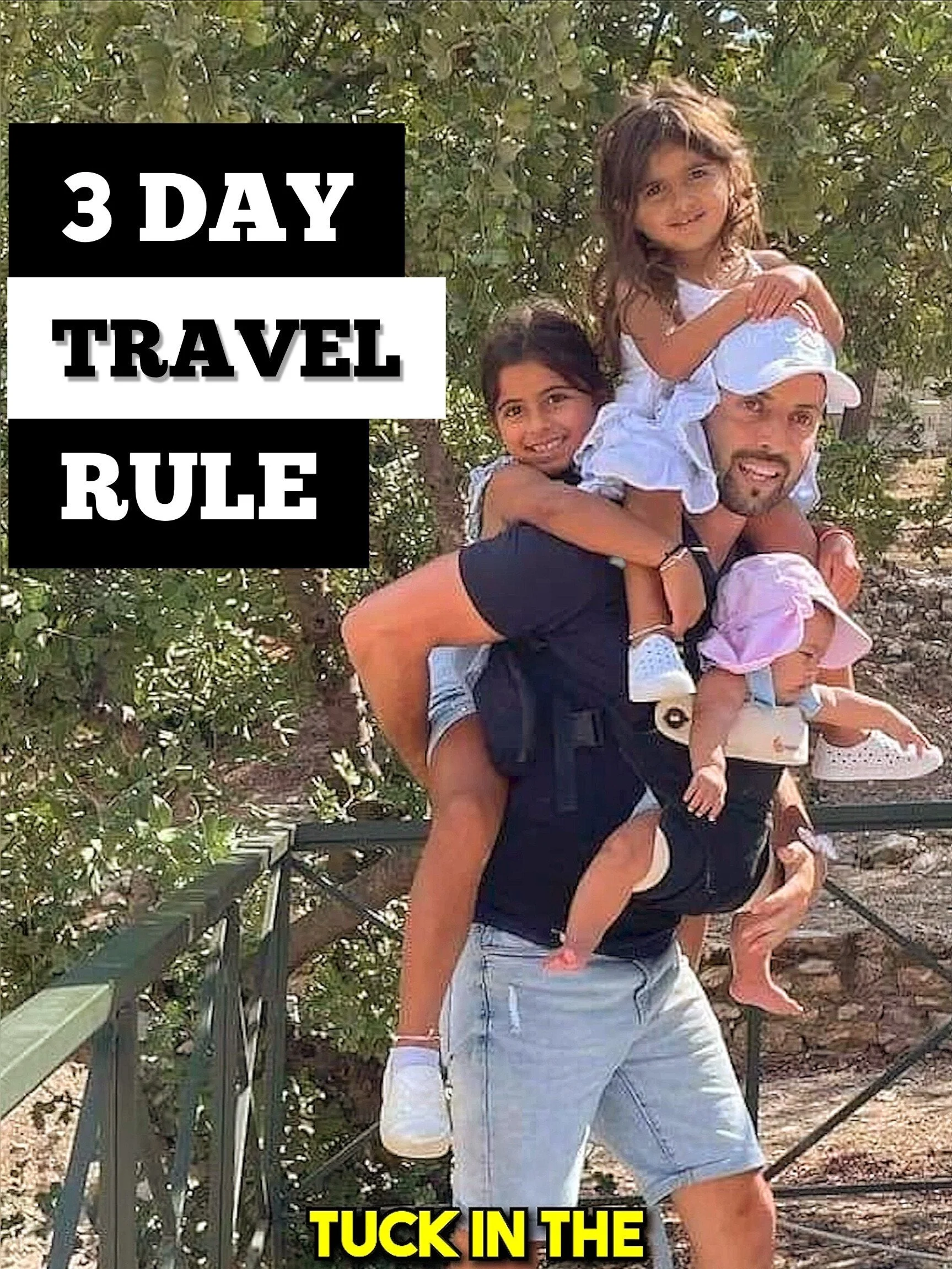MY 3-DAY TRAVEL RULE WITH MY DAUGHTERS: 3 DAYS OR LESS
“I’ve observed men who would say, “I have the kids on Sunday,” only to later complain about how their children were driving them crazy. This puzzled me because I grew up spending time with my parents throughout the day at our family restaurant, and I cherished those moments.”
My Travel Rule: 3 Days or Less! Don't be a 'Sunday Father
Having three young daughters has profoundly influenced my approach to travel and work-life balance. I've witnessed the lifestyle of individuals working in high-pressure environments like hedge funds, especially in places like Connecticut, and I've seen the negative impact it can have on family life. I've always carried with me the lesson of not becoming a "Sunday Father."
I've observed men who would say, "I have the kids on Sunday," only to later complain about how their children were driving them crazy. This puzzled me because I grew up spending time with my parents throughout the day at our family restaurant, and I cherished those moments.
So, when it comes to my own travel schedule, I've made it a personal rule to keep trips short. Before the pandemic, I would frequently do quick trips from Los Angeles to New York City and back within 23 hours. I'd leave at night, tuck in my girls, arrive in NYC at 5 AM, spend eight hours in meetings, and then head back on the plane, arriving home by nighttime. It was grueling and took a toll on my body, but it allowed me to maximize my time with my family.
I've also applied this principle to international travel. For instance, I've gone to China and back in just two days. When I'm at my destination, I make every moment count. I maximize my time by meeting with employees, clients, visiting factories, and collaborating with partners to ensure that my business objectives are met.
In essence, my "3 days or less" travel rule is about prioritizing my family while also effectively managing my professional responsibilities. It's a way for me to strike a balance between pursuing my business goals and being an active and engaged father to my daughters.
THe effects of traveling parents and how it affects their children. what you can do to alleviate this.
Traveling parents can have a significant impact on their children, both positive and negative. While travel can enrich a child's perspective and provide unique opportunities for growth, it can also pose challenges such as separation anxiety and disruptions to routines. Here are some effects of traveling parents on their children and strategies to alleviate potential negative impacts:
Positive Effects:
Cultural Exposure: Traveling parents can expose their children to diverse cultures, languages, and traditions, fostering tolerance and open-mindedness.
Adaptability: Children of traveling parents often become more adaptable and flexible in different situations, learning to adjust to new environments.
Independence: Separation from parents during travel can encourage independence and self-reliance in children.
Global Perspective: Traveling parents can instill a global perspective in their children, helping them see the world as a broader, interconnected community.
Negative Effects:
Separation Anxiety: Frequent or extended absences of a traveling parent can lead to separation anxiety and emotional distress in children.
Disruption of Routine: Travel can disrupt daily routines, affecting a child's sense of stability and consistency.
Reduced Quality Time: Children may feel that they have less quality time with their traveling parent, leading to feelings of neglect.
Education Disruptions: Frequent travel can interfere with a child's education, causing gaps in learning or challenges in keeping up with peers.
Strategies to Alleviate Negative Impacts:
Open Communication: Maintain open and age-appropriate communication with your children about your travel schedule. Explain the purpose and duration of your trips and reassure them of your love and commitment.
Create Consistency: Establish consistent routines and rituals, even when you're away. Regular video calls, bedtime stories, or special messages can help maintain a sense of connection.
Quality Over Quantity: Prioritize quality time with your children when you're home. Make the most of the time you have together by engaging in meaningful activities and bonding experiences.
Involve Them: If possible, involve your children in your travel plans. Share your experiences, photos, and stories to make them feel connected to your adventures.
Set Boundaries: Balance work commitments with family time. Establish boundaries to ensure you're not constantly on call or checking emails during your family time.
Support Systems: Utilize the support of family, friends, or caregivers when you're away to ensure your children have a stable and nurturing environment.
Education Continuity: If travel affects your child's education, work with their school to develop strategies for keeping up with coursework or consider homeschooling options.
Emphasize Quality Travel: When possible, bring your children along on your travels to spend quality time together and create memorable experiences as a family.
Reconnect After Travel: Allocate time after returning from a trip to reconnect with your children and listen to their experiences and feelings.
Seek Professional Help: If your child experiences prolonged emotional distress or anxiety due to your travel, consider seeking the guidance of a child psychologist or counselor.
Balancing a career that involves travel with parenthood is a complex challenge. By being mindful of the effects on your children and implementing strategies to mitigate negative impacts, you can create a healthy and supportive environment that allows both you and your children to thrive.





















